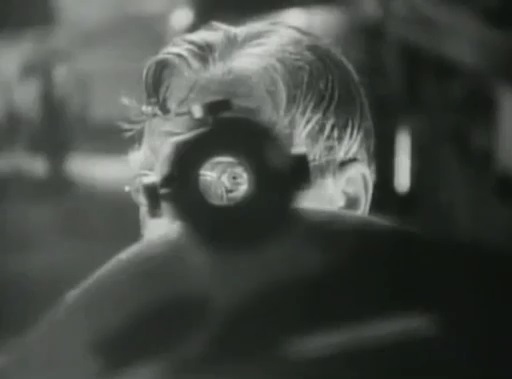Below the Sea
A year later,
Henry King shot the opening sequence of Marie Galante in French without
subtitles, Rogell has U-170 in German, cruising submerged with a chest of gold
bullion. It sights a sailing vessel under a Norwegian flag, and surfaces to
give battle. As the U-boat skipper suspected, it’s an American ship, and
furthermore a Q-boat that opens fire, sinking the sub.
In 1929, the skipper goes back for the gold with two
American partners, but runs aground.
In 1932 he’s signed on as captain of an
oceanographic expedition, with the same two partners aboard and a young lady
who has financed it all in the name of science.
She’s full of herself and the expedition
photographer but falls for the deep-sea diver. The ending was remarked by
Mordaunt Hall in the New York Times, but he thought the giant octopus
was too much, ten years before DeMille’s Reap the Wild Wind.
Air
Hawks

“Hiya Marconi, how’s your wavelength?” Well
before Q planes (dir. Tim Whelan), “a
machine capable of destroying airplanes from a distance by some kind of electrical
control,” well before Only Angels Have
Wings (dir. Howard Hawks), a fight for the mail contract that means success
(cf. Basil Dearden’s The Smallest Show on Earth, Terence
Young’s Dr. No,
Guy Hamilton’s The Man with the
Golden Gun).
Concurrent with
Hitchcock’s’ The 39 Steps
in London, Tala Birell’s
accent, “close those curtains, quickly!”
“What for?”
“Two of
Arnold’s men are out there, waiting for you. Close
them!” Ralph Bellamy (“once America’s Ace of Aces”)
sees them, and so does the camera. Furthermore, he makes his exit in disguise,
not wearing the milkman’s jacket but an ambulance driver’s white uniform.
And there is a mysterious Chief.
Andre Sennwald of the New
York Times, “headstrong tale”. Leonard
Maltin, “fun, fast-paced”.
TV Guide, “improbable sideline
story”. Halliwell’s
Film Guide, “routine”, citing Variety, “marquee weakness.”
The Admiral Was a Lady
Here’s a
nice genteel way now to bring the boys back home after a war, one of
them’s a dame, see. She gets stood up by her beau after picking up her
demobilization stipend, and later she’s in danger of getting shanghaied
by one of those rich Johnnies who sweated things out in a sauna, you know, a
profiteer (he’s played by Rudy Vallee). Oh, do things look bleak, but
she’s got a nice guy interested in her, well, not so much nice you might
say. Just one of the boys.
Edmond
O’Brien gets his Irish well up for The Admiral Was a Lady around
the time of D.O.A., l’amour et la mort (Victor Mature elsewhere
has a great variation of this theme as a starving actor eating at the Automat
for free, it all goes back to The Three Stooges and Chaplin). Where did the
scenic designer Van Nest Polglase go after Ginger and Fred? Right here,
fabricating Los Angeles interiors with the best of ‘em. What he does with
little or no budget is “a miracle... not for a man with taste and
ingenuity.” Here you can see the taste and design of the 40s developing
into the 50s.
Rogell (like
Andrew L. Stone) is a root of Bogdanovich and Andrew Bergman. Snappy
choreography is his forte, in a manner of speaking. It’s a nice
arrangement of the situation, to work his actors like a flea circus as they
portray uninspired idlers.
Not that
O’Brien doesn’t have ideas, until recently he was flying a bomber
named Sinful Sinthia, but why spin your wheels to the top when you can wangle a
chummy living right where you are?
Gradually these
goldbricks get their rusty swords beaten into plowshares wrangling with The Jukebox
King, whose ex-wife has run off with the Admiral’s intended, an
impeccable fellow—if things aren’t just so, “he’s on
his roller-skates.”
They sneak into a
theater at intermission (the show is called Swing Time) and head for the
boxes. “We’re safe, very few people can afford box seats.” An
apple is an inspiration, O’Brien accepts one and takes a bite, makes a
face, lowers the apple, and Rogell musters his resources for a diligent
dolly-in to the bite (he and Stanley Cortez get a collapsible chiaroscuro
framing some scenes), which dissolves to a cabin cruiser on the Pacific with
the Admiral collywobbly on the afterdeck.
“The black
market has a swing shift now!” When their plane went down in the English
Channel and they were reported dead, one of the boys let it ride so his
well-to-do girl wouldn’t have to contend with him. They choose
who’ll enter a prizefight to send him back home. “Well, who’s
got the most blood?”
O’Brien
landed them in the drink, and suffers for them all, but states the theme,
“happiness doesn’t depend on money.” Cinderella forsakes the
prince for someone even more charming.
Garry Owen right
out of It’s a Wonderful Life lends a note of Capra.